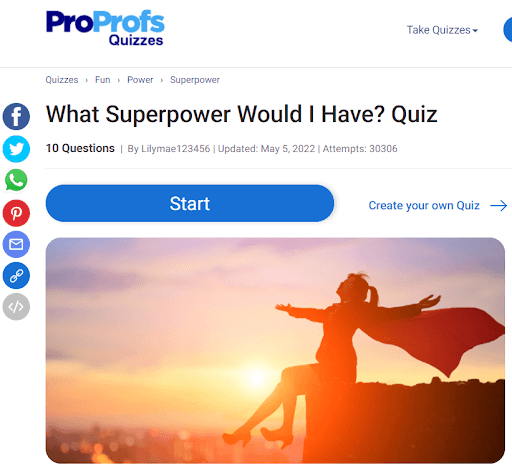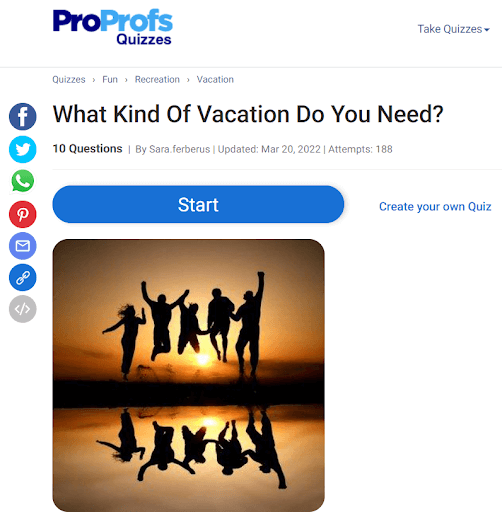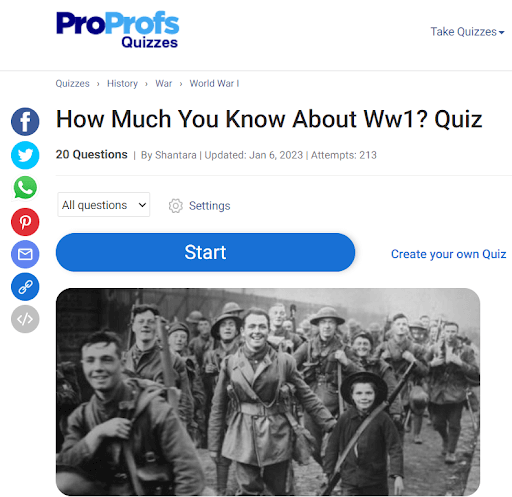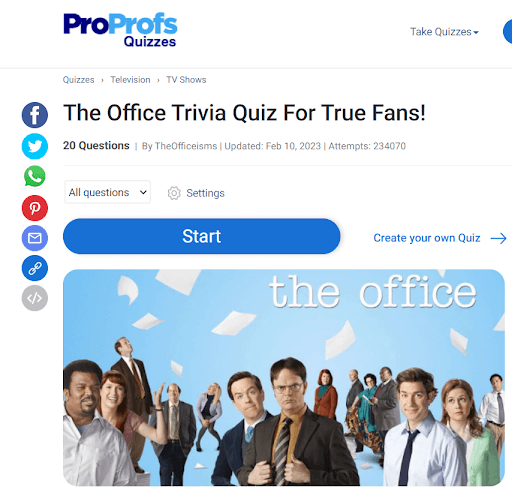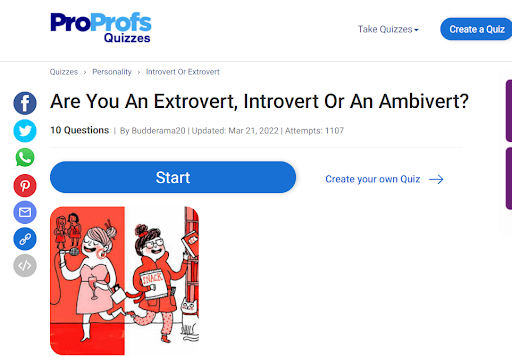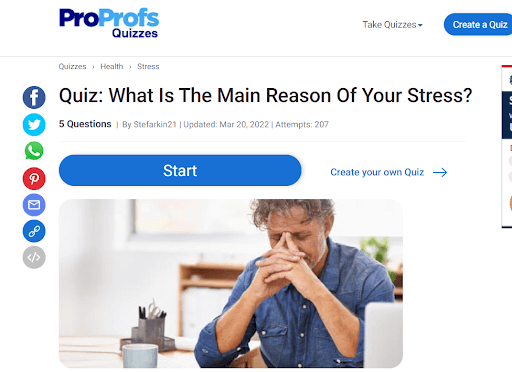
You can’t cook great pasta without the right ingredients. You’ll need the right amounts of flour, eggs, tomato, cheese, and more.
Individually, they’re okay, but combine them and cook them perfectly — you’re in pasta heaven.
Quizzes work in the same way.
It’s never a single element that makes a great quiz but many. And one of the most surprisingly challenging elements of a quiz is the questions themselves.
With a great quiz title, image, and description, you can get the audience to take your quiz. But once they start attempting it, it depends on the quiz questions you create whether they get it to the end or not.
If your quiz questions aren’t engaging enough, it’s likely that a portion of your quiz takers will leave your quiz unfinished. That’s something you don’t want, do you?
It takes a lot of creativity and diligence to make questions engaging.
The mantra for an engaging quiz question is:
‘Make Them Interesting + Concise + Clear’
So, I did some digging and came up with some of the greatest hacks to create quiz questions that’ll captivate your audience and tempt them to complete your quiz.
But before we get to them, let’s understand the following:
Watch: How to Create an Online Quiz in Under 5 Mins
Why Is It Important to Create Engaging Quiz Questions?
Although many factors contribute to the success of a quiz (which have been talked about a zillion times), very little attention has been given to its questions when, in fact, they play a vital role in carrying participants to the end.
The first thing you should consider when deciding how to write good quiz questions is the quality of the questions. And the reasons are:
- Participants won’t reach the end of a quiz if the questions are annoying or escape their interest.
- The questions are the right spot to create a conversation with quiz takers and build rapport.
- Unlike other forms of content like blogs and videos, where you address a broad audience all at once, quiz questions and answers provide a one-to-one medium to communicate with your audience.
That’s why knowing how to write perfect quiz questions is critical to constructing engaging quizzes.
Your real goal should be for the participant to invite others to take the quiz.
Anyone can create quiz questions, but coming up with engaging questions that make people complete your quiz takes a lot of trial and error, practice, and skills.
And that brings us to our next section.
5 Components of an Engaging Quiz Question
Whether you deploy online quizzes for student assessment, employee evaluation, or digital marketing, the importance of framing engaging questions remains the same.
There are several elements that make quiz questions delightfully engaging. Let’s look at five of them:
- Relevance
Make sure the questions you choose for your quiz are relevant to your target audience. By tailoring them according to your audience, you create opportunities for meaningful learning.
In other words, share need-based quiz questions that help determine the participants’ competency according to their skill levels. The questions should address the problem-solution scenario.
For example, a beauty blogger’s audience will be definitely interested in the following questions:
What Hair Color Should You Have?
What’s My Skin Tone?
What Foundation Should I Use?
Similarly, for a pet shop, its audience will find the following questions interesting:
Which Dog Breed Matches Your Personality?
How Much Do You Know About Keeping Pets?
What Is the Best Way to Potty Train Your Puppy?
- A Sense of Curiosity
Curiosity is a “deep-seated and fundamental human emotion.” In fact, you can very well use the concept of curiosity gap to create online quizzes. Create online quiz titles that are irresistible and even more curious quiz descriptions. The titles and quiz descriptions should be influential factors for your audience.
Take a look at these quiz topics, for instance. They all raise questions with the premise that you’ll either get to know something about yourself or get to test your knowledge about other things, spiking your curiosity about getting it right or learning something new.
What Anime Character Do I Look Like?
Which TikToker Are You?
What Do You Know About Rare And Exquisite Animals?
How Much Do You Know About Nutrition?
Which Harry Potter Hogwarts House Do You Belong To?
-
Visual Appeal
It is easier to get people to take your quiz than to keep them hooked to your quiz. Of course, you can create engaging questions that will keep the quiz takers occupied, but a visual appeal adds more to their overall experience.
For that, you can use images and videos to make the quiz interesting. Also, play with the color schemes, themes, and fonts to make your quiz visually appealing.
Read: How to Add Images and Videos to Quiz Questions & Answers
-
Short Quizzes With Creative Results
A short and engaging quiz with a maximum of 10 questions that give positive results is most likely to be shared by those who take it. If you give the quiz takers a negative or adverse outcome, they might not share it around.
On the other hand, if you create upbeat results, the quiz will most likely be shared by your audience, leading to more prospects for you.
Check out this example of a creatively framed quiz result from a quiz titled How Good Is Your Vocabulary?

- Shareability
When shared around and attempted in large numbers, a quiz will perform amazingly well. But for that to happen, it is important that the quiz is shareable and has numerous social share buttons throughout the quiz.
This way, it becomes easier for quiz takers to share the quiz with their family, friends, and colleagues. Options for sharing in quizzes increase your chances of going viral.
Watch: How to Create a Viral Facebook Quiz Easily
These elements can make or break an online quiz. So, make sure your quizzes are made up of these essential components to get positive results.
In the next section, we’ve shared some examples of quiz questions that you can take inspiration from and use in your online quizzes.
10 Examples of Quiz Questions That Engage Audiences
When we say engaging quiz questions, we mean a quiz with questions that draw your audience.
If you’ve been wondering how to write effective quiz questions, the following examples of the best quiz questions will give you some great ideas. We’ve segregated the questions into different categories to help you understand their applications better.
-
Questions That Arouse Curiosity
As we already mentioned above, curiosity is an integral part of human emotions. So, it makes sense to promote this element in your quizzes.
Ask questions that make your audience curious about themselves and lead them to self-discovery.
Here are two examples of such quizzes:
-
Questions That Instill a Desire
Quizzes engage the audience when they can connect with their innate desires.
For example, if you run a fashion house, you can ask your audience which fictional fashionista is their role model.
Or, if you’re a travel company, you can spark your audience’s interest by asking them to find out their next travel destination.
Here is an example of a desire-based quiz question:
-
Questions That Challenge
There is something intriguing about questions that challenge us. They assess our knowledge about any particular topic and see whether we’ve got our facts right.
If we don’t, no one has to know. But if you do get them right, you can share your results and let the world know!
This concept applies to your audience too. Create questions that challenge your quiz takers to test their knowledge and encourage them to share their results.
Here are two examples of challenging quizzes:
-
Questions That Compare
Comparing ourselves to others is a natural human tendency. We do it all the time, whether it is our looks, success, wealth, or knowledge. All of these are good things. It isn’t inherently bad. Comparison often leads us to self-awareness.
In the same way, creating questions based on comparison can help your audience know what they want, where they want to be, and get valuable feedback on how they measure up.
Here are two examples of questions that are based on the concept of comparison:

-
Questions That Reveal Demographic Information
Sometimes, it is important to know where your audiences come from, especially when you are using quizzes for intelligent marketing by segmenting and identifying leads.
Depending on your brand, this may include their ethnicity, race, income, education, and employment.
In that case, you can use a quiz with questions that reveal the required demographic information of your audience.
Here’s an example of such a quiz:
-
Questions for Lead Qualification
This is another example of marketing quizzes.
By using lead qualification questions in your quizzes, you can predict the likelihood of converting your prospects into customers better.
It will also keep you away from wasting your time on low-quality prospects. Instead, you can focus on the prospects that best fit your ideal customer profile based on the answers they provide.
Here’s an example:
-
Questions That Define Problems
Quiz questions can help you accurately define the problems of your audience. Once you’re familiar with their pain points, you’ll be in a position to offer effective solutions to their problems through your products or services.
Look at the following example:
Which ones of these quizzes would you love to use? Let us know!
But that’s not all we’re leaving you with in this post.
Let’s now look at the main topic of this post. Don’t forget to take notes!
10 Tips to Write Engaging Quiz Questions
Here are some best practices for creating engaging quiz questions that will save your quizzes from being ignored.
1.Keep Them Simple
How would you feel if you had to re-read a question several times before you could understand it? Not very exciting, right?
So, never try to outsmart your quiz takers by making questions high-sounding. If you try to trick your quiz takers with tricky and complicated questions, you’ll end up losing the game.
The quiz takers may spend too much time racking their brains instead enjoying the quiz and may drop out of the quiz even before it ends.
When you use clear, brief, and precise language, it will enhance quiz takers’ interest and improve the results.
Take a look at this example from ProProfs Health Quiz.
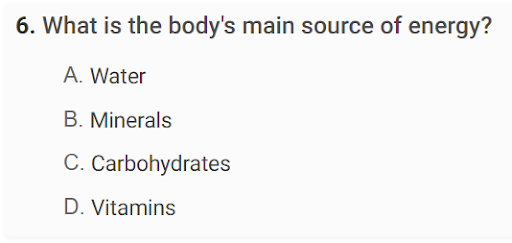
The language is simple and easy to understand. All of the questions in this quiz contain common, everyday terms.
Remember – The goal of a quiz is to make the participants complete your quiz, not to show how smart you are in quizzing.
2.Mind Your Questions’ Length
If there’s one thing common among most high-performing quizzes, it is the length of their questions. They’re almost all fairly short.
An ideal question would have 6-8 words. It is important to keep in mind that your quiz takers are here for fun. So, spare some time and create short but clear questions.
Bonus Tip: Along with the question length, keep the number of questions in mind if you want your quiz to be engaging. For example, 8-question quizzes tend to be engaging for casual topics like “Find out your personality”, which consists of personality quiz questions.
3.Use Images & Videos
‘A picture is worth a thousand words.’
This statement stands true even in the case of quizzes. Images can make a massive difference to your quizzes.
Also, did you know that according to the Social Science Research Network, 65% of people are visual learners?
Luckily, some quiz maker software allow you to insert images and videos in question and answer options.
Here’s how including images & videos in a question can help:
- You can avoid writing lengthy or wordy questions since an image or video alone can convey the data or scenario.
- Including images in the answers help the quiz taker remember the correct answer for a longer time.
- Images also bring humor to your quiz questions and answers and make learning fun.
Check out this quiz, for example, which asks quiz takers to identify historical landmarks based on the image displayed with each question:
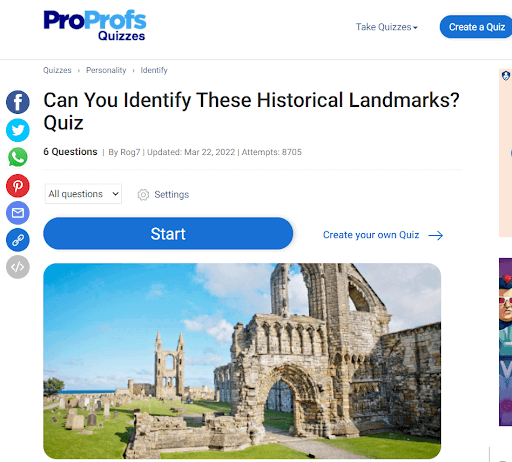
Read: How to Create Interactive Video Quizzes
yu67yu67
4.Write Questions Based on Your Quiz Objective
Even though this is a no-brainer, I’d like to put it out there. Don’t deviate or stray away from your quiz topics. Ask questions only related to the subject of your quiz.
For example, asking your quiz takers about their favorite breakfast in a quiz titled “What Kind Of Entrepreneur You Are,” just because you want to have an unusual question is not only bizarre but deceiving.
Have someone review your quiz as they can tell you if any of your questions are just totally off-topic. Make sure your quiz takers get what they expected when they start a quiz.
5.Pay Heed to the Number of Questions
One of the factors that decide the success or failure of your quizzes is the number of questions.
Too many questions may bore the participant, and they might give up the quiz even before completing it.
On the other hand, having too few problems may make the participants feel the quiz is too superficial to answer. Look at these popular fun quiz questions, and you will surely see this pattern.
The average quiz taker won’t have more than a couple of minutes to complete a quiz. So, the ideal number of quiz questions falls somewhere between 7-10.
Here’s a Tip: You can tell your quiz takers how many questions there are in advance.
For example, Pick Seven Junk Foods, And We’ll Tell You What % Trash You Are, one of the best-performing Buzzfeed quizzes of all time, lets its participants know that there are seven questions.
And this quiz, which tells you which celebrity you look like, clearly states at the very beginning that there are just 15 questions to answer.
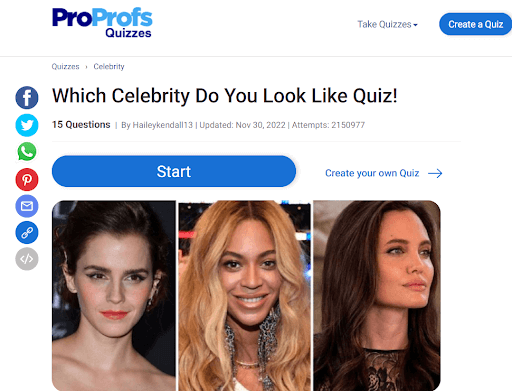
To ensure all your questions are perfect for the quiz you’ve created, start by brainstorming questions and then eliminate those that aren’t fun, are too difficult, or don’t correlate with the outcomes.
Bonus Tip
To make sure that your quiz has only engaging questions, you can use quiz software or test generators to create a quiz.
Using quiz software will make writing quiz questions a breeze since it already has a pool of ready-to-use questions on thousands of topics.
You can find funny quiz questions, history quiz questions, geography quiz questions, Facebook quiz questions, etc., that you can directly import into your quiz.
6.Ask People About Themselves
Once, I was researching narcissism for a blog post, and I came across this article on Psychology Today that said, “talking about oneself activates the same areas of the brain that light up when eating good food, taking drugs, and even having sex. Simply put, self-disclosure is gratifying. It gives us a neurological buzz.”
Sounds accurate, right?
People love talking about themselves.
According to Scientific American, in a world full of ideas to discover, develop, and discuss, people spend the majority of their time talking about themselves because it feels good.
Creating questions that ask the quiz takers about themselves can be your best chance at establishing a connection with your audience. Thanks to this, the user will often feel less dissociated from the quiz and be more likely to complete it.
Here’s an example:
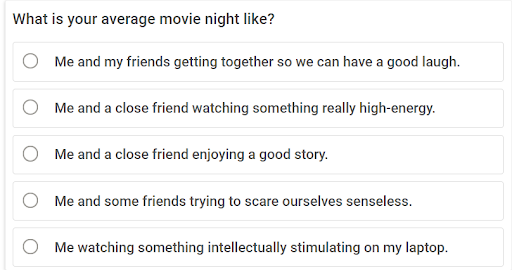
Write to One Person: Be Personal
As I said above, you can use quizzes to establish a connection with your audience. Quizzes can be personal and leave your quiz takers with a satisfying experience.
For this, it is important to make your quiz takers feel important and addressed.
A quiz shouldn’t feel like a game but a conversation.
There is a huge difference between asking someone’s preference and a generic quiz question.
For example:
‘Select One’ versus ‘What would you choose (be honest)?
These are both asking the same question, but the latter feels more personal because of the use of the word ‘you.’
Here’s another example of such a question:

Address Your Audience in Their Lingo
When you’re creating a quiz, you obviously know who you’re creating it for. Every audience group has its own lingo, and it can vary on the basis of the country, age group, and more. So should your questions.
It’d only play in your favor if you use your target audience’s lingo in your quiz. This will help you create a sense of belonging with your audience.
Many top-rated online assessment software support multiple interface languages, so choosing a language for your audience is easy.
Here’s an example:
In a quiz on food, a simple question like this has to be changed depending on whether the audience is American, British, or Australian:
American
What’s your favorite takeout food?
- French fries
- Potato chips
British
What’s your favorite takeaway food?
- Chips
- Crisps
Australian
What’s your favorite takeaway food?
- Hot chips
- Cold chips
Another example is changing the lingo for different age groups:
Your friend decides to get the crew together for a party bang in the middle of the weekday. You will:
- Think he is cray
- Totes go for it!
Your friend decides to get your friends together for a party in the middle of the weekday. You will:
- Think he is senile
- Totally go for it!
Maintain a Consistent Tone
One important aspect of engaging your audience with your quiz is maintaining a tone of voice. You can choose a particular tone of voice according to the nature of your quiz. For example, you can use a friendly tone, an authoritative tone, a happy-go-lucky tone, or a humorous tone. It really depends on how you want your readers to take your quiz.
No matter which tone you choose, remember to keep it consistent throughout your quiz. It is a good way to engage the audience and take them to the end of your quiz.
Maintaining a consistent tone can make the experience so enjoyable that the quiz takers can consider sharing it with their friends. Also, it helps establish a unique voice for your brand.
Here’s a question from a quiz called World’s Hardest Science Quiz You’ll Ever Take. The quiz follows a series of questions about the universe and the species therein. It presents four choices of answers for each question and each question has at least one option that’s simply there to make the quiz taker laugh.

10. Apply Question Logistics
There are certain question logistics that you should keep in mind while creating your quiz questions:
- Use Pre-Made Questions & Quiz Templates– Save hours of time!
Most online quiz makers offer quiz templates and ready-to-use questions that come in handy when creating a quiz. These templates are designed by industry professionals and are the reason behind many high-performing quizzes. The ready-to-use questions, on the other hand, are well-researched.
Take for example ProProfs, which offers more than 100 scored quiz and personality quiz templates and over 1000,000 ready-to-use questions across thousands of topics.
- Use Different Question Types – Make your quiz look interesting!
Adding different types of questions to your quiz can do wonders. There are certain types of questions that you can’t use in a paper-based test. For example- video questions, audio questions, and hotspot questions. But you can definitely use them in an online quiz.
Here are examples of an audio question and a video question created using the ProProfs Quiz Maker.
And here’s what a hotspot question and its response look like:
Read: How to Create a Quiz Using Hotspot Questions
Bonus Tip: Now that you know how to frame quiz questions, keep in mind that it does not just stop at the question. “Don’t forget to write great feedback.”
It’s one of the best ways to keep a reader or quiz taker engaged. You can have different messages show up when someone answers it correctly or incorrectly.
A simple mantra to add feedback? Encourage if correct. Educate if incorrect.

So, the next time you sit down to write quiz questions, follow these tips, and you’ll surely end up with a popular quiz. And, once you’re done, don’t forget to pat yourself on the back for being a perfect quiz writer.
That’s all about how to write quiz questions that are engaging and impactful.
Before we wrap up, let’s quickly look at a few things you should avoid while creating online quiz questions. They can help you stay clear of possible faux pas.
5 Things to Avoid While Creating Quiz Questions
Many learners feel that quizzes are a waste of time and, as a result, don’t take them seriously. This can keep you from accurately and incrementally measuring learning.
Making an effort to avoid the following things in a quiz will improve learners’ attitudes toward online quizzes and their results.
- Avoid asking questions on trivial or inconsequential matters. Instead, make your questions weighty and meaningful.
- Don’t make assumptions. Just because you think something is simple, it doesn’t mean quiz participants will also feel the same.
- Don’t take questions with the same wording from your course material or textbook. If it’s a fill-in-the-blank question, reword the text into understandable terms to get precise answers previously identified in class.
- Avoid acronyms in a question unless you define them, they are common acronyms, or you are asking to expand them.
- Challenge your learners but avoid asking frustrating trick questions. Learners can easily sense when you are using quizzes as mere busywork.
Ready to Create Great Quiz Questions?
The types of questions you ask in quizzes often dictate how your learners exercise their minds, acquire knowledge, and apply it to real-world situations. Using effective question techniques takes practice and skill.
This means that writing top quiz questions may not be easy, but if you follow the tips shared above, you’ll come up with some of the greatest quiz questions that your audience will love to attempt and share.
With ProProfs Quiz Maker, you can get help from the question library to add ready-to-use questions to your quizzes. These questions are well-researched and chosen by professionals. You can also explore different question types to use in your quizzes and make them more interesting. It’s easy and super fun.
Do you want free Quiz Software?
We have the #1 Online Quiz Maker Software for complete learning & assessment
